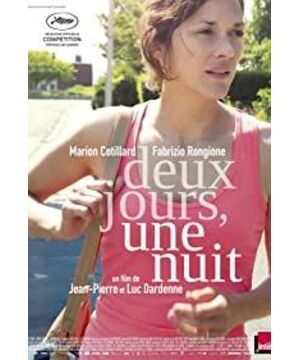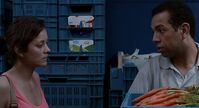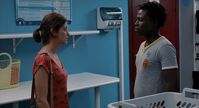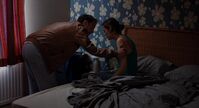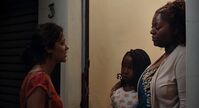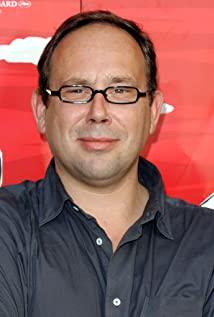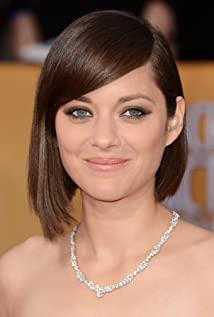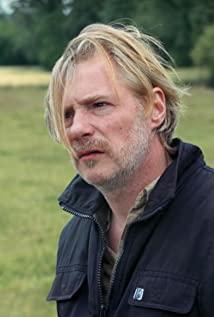The photography
brothers were originally from making documentaries, and their desire for truth and objectivity is easy to see. It is even more logical to choose handheld photographers. As far as feature film shooting is concerned, this handy technique continues. It has two main characteristics: one is follow-up and shaking. There are countless examples in this regard. Both "Rorna" and "Rosetta" have been seen from the back. Impressively, Oliver Gulmai was dubbed the "back-of-the-head actor" by netizens. As for the shaking, in the two films "Rosetta" and "Son of Others", the vertigo produced by the motion lens is absolutely comparable to Du Kefeng's photography. If the viewer is in a slightly drunken state, I am afraid that he can directly vomit. . The second is a lot of close-ups and close-up shots. Because of the claustrophobia caused by the narrowness of the picture, you can compare it with Abu Dai Cauchyxu (to put it simply, Cauchyxu's tone seems to be warmer). But combined with the plot, in expressing the unknownness of the living state, the instability and the contradictory entanglement of showing the character's psychology, the strong shaking and oppressive close-up lens undoubtedly played a role in fueling the flames and icing on the cake. Compared with Lou Ye, the difference between the two is mainly reflected in the length of the lens and emotional brewing. Dane’s hand held should be shorter and simpler. In other words, they like to directly use the lens to participate in the narrative, while Lou Ye is more willing to be stubborn. Separate parts to express emotions. In addition, the portable photography directors worth mentioning at this stage are Andrea Arnold and Karin Pete Netzer. On the whole, these two should be in the same line. "Wuthering Heights" is the best hand-held work I have ever seen, and "Child Pose", which won the Golden Bear last year, is more like Netzel's tribute to the Danes.
Soundtrack
One sentence sums up the characteristics of their film soundtrack, that is, there is almost no soundtrack. Probably because of this, people are more keen to use it as a matter of fact. For example, in "A Promise", "Rosetta", and "Son of Others", not having a soundtrack is equivalent to abandoning the modification and restoring the scene. This kind of naturalism The expression technique is undoubtedly an excellent fit for the film's sharp and heavy theme and calm and objective posture. The two films that used the soundtrack, one is in the latter part of "Rorna's Silence", suddenly "Beethoven Piano Sonata No. 32 in C minor", and the other uses a short soundtrack four times. "Cycling Boy". How should we view this change? According to the director’s interview, I didn’t think too much about the special features of using or not using it. I thought that the place should be used, so I used it. (To the effect) In the latest work, in addition to natural sound effects, the Danes also used car music to let the audience hear two songs. "La nuit n'en finit plus" is a sad-sounding song. At that time, Sandra's visit to ask for help was not smooth, and the situation was mixed. She asked her husband to turn on the music that had been turned off, and even hummed with a crying and laughing expression. The second rock music is more exciting than the previous one, and the number of vocalists has increased from two to three. The director used a progressive comparison method to embellish these two songs, which is self-evident. But it needs to be pointed out that this magical active music technology may not be a breakthrough innovation, because this technique has been previewed earlier, and it is actually the same as the car CD "Blue Danube" in "Children".
theme
The Darnet brothers have always paid attention to the lives of the people at the bottom of Belgium, and the protagonists of their movies are always inseparable from the young people who are on the margins of society (immigrants, unemployed, and people living in asylums). The "awakening of conscience" is almost considered The motif of their work is to use their personal conscience to compete with the cruel reality, in order to achieve the purpose of illuminating this indifferent real world with a gleam of humanity: the young Yi Ge in "A Thousand Years of Love" In order to take care of the laborer’s wife and children who rented in her own home, she did not hesitate to choose her father as an enemy; Rorna in "Lorna's Silence" stubbornly chose a road contrary to expectations because of conscience. ; Rosetta in "Rosetta" finally had nowhere to go. The reasons were both life difficulties (repeated unemployment) and mental pressure (ashamed to friends), but the only friend returned at a critical moment with virtue and grievances. In front of her house; Bruno in "Children" paid the price of imprisonment for his own risk, but his unfailing nature at the last moment is also the key to winning his girlfriend again; "Son of Others" only uses one form The illusion of "Cycling" has turned a seemingly inexhaustible journey of revenge into invisible; the clear and pure young mind in "The Cycling Boy" also reflects the vulgarity and comicality of the adult world. Considering "Two Days and One Night" from this perspective, when Sandra asked her colleagues for help, it was actually a torture that directly pointed at the conscience of the other party. In terms of fullness, it is impossible to be complex and rich. This is also one of the major shortcomings of "Two Days and One Night" compared with previous works.
end
Compared with the increasingly intensified “epic feelings” in the film world today, the Dannet brothers have acted in the opposite direction, which is probably an important reason why Cannes values it. In addition to the simple and natural pursuit of art, it is especially worth mentioning that there is a twist in their script. At the critical moment when the characters in the play make a decision, the Dane brothers’ habitual tactics are never flashback, nor foreshadowing, which is different from the usual rules of the cause and effect of image brewing (in fact, there are of course, but the details have already been incorporated into the details. In), they are more focused on grasping and presenting the present moment. Therefore, such a decision is often both abrupt and stunning. In my eyes, this is the fundamental difference between the Darnet brothers and ordinary directors. And this kind of transition occurs mostly at the end of the movie, which also leads to their works always getting better and better, always handing the knife down, always stopping abruptly, and always having a good ending. For example, the endings of "Son of Others" and "Lorna's Silence" are as light as a flash of lightning, but they are enough to cut through the sky, embodying the ingenuity of wisdom and the literary nature. On the other hand, in "Two Days and One Night", the scene of Sandra's suicide is almost the most dramatic turning point in the whole movie. Before making a decision, there is a scene of her talking on the phone with a pair of children in the car. The expression was neither sad nor happy, the next time the camera turned, Sandra carefully helped the two children to make the beds, and then went downstairs and told her husband to buy the sandwiches they were going to eat at the picnic tomorrow, and then came down, it was a follow-up camera and filmed her. Walk from a distance to the lens, and then continue to the far store on the other end. It is hard to imagine that in this process, she has actually made the decision to commit suicide. Since then, the good news brought by my colleagues' timely visits put it in the dilemma of despair and hope, but the film did not stop at this point of play similar to "Rosetta", but continued to move forward. How to present the opposition between light and darkness has not surpassed this scene. This also makes the style and meaning of the film vaguely fixed on the inspiration of "If the heart is there, the dream is there, the big deal is starting from scratch". A big pity.
View more about Two Days, One Night reviews


